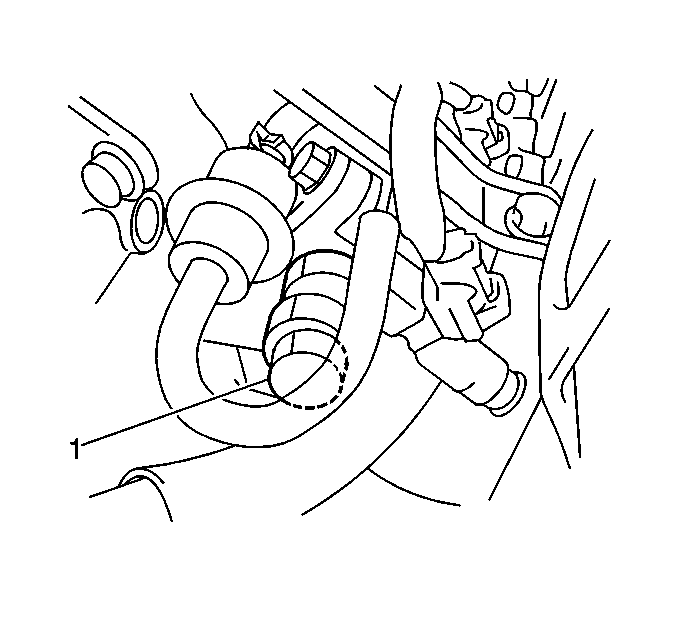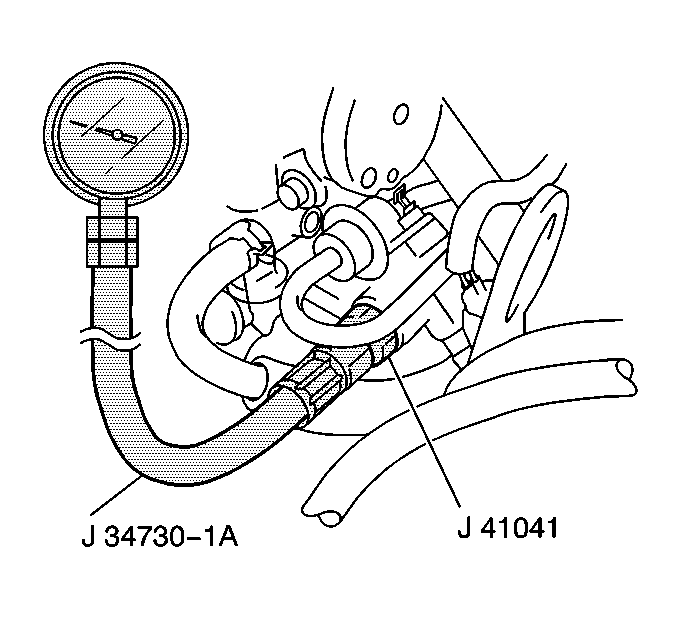Installation Procedure
Tools Required
| • | J 41041 Fuel Pressure Gauge Adapter |
- Relieve the fuel system pressure. Refer to
Fuel Pressure Relief
.
Caution: Unless directed otherwise, the ignition and start switch must be in the OFF or LOCK position, and all electrical loads must be OFF before servicing
any electrical component. Disconnect the negative battery cable to prevent an electrical spark should a tool or equipment come in contact with an exposed electrical terminal. Failure to follow these precautions may result in personal injury and/or damage to
the vehicle or its components.
- Disconnect the negative battery cable.

- Remove the fuel plug bolt (1) from the end of the fuel rail.

- Install the J 41041
to fuel rail.
- Install the J 34730-1A
to the J 41041
.
Notice: Use the correct fastener in the correct location. Replacement fasteners
must be the correct part number for that application. Fasteners requiring
replacement or fasteners requiring the use of thread locking compound or sealant
are identified in the service procedure. Do not use paints, lubricants, or
corrosion inhibitors on fasteners or fastener joint surfaces unless specified.
These coatings affect fastener torque and joint clamping force and may damage
the fastener. Use the correct tightening sequence and specifications when
installing fasteners in order to avoid damage to parts and systems.
- Connect the negative battery cable.
- Turn ON the ignition in order to pressurize the fuel system.
- Turn OFF the ignition.
- Check for any fuel leaks and repair as necessary.
- Start the engine.
- Idle the engine at the normal operating temperature.
- Verify the fuel pressure as follows:
| • | 210-260 kPa (30-37 psi) with the engine idling. |
| • | 250-300 kPa (36-43 psi) when the engine is not running, the ignition switch is On, and the fuel pump running. |
| • | The fuel pressure should hold at or more than 180 kPa (26 psi) within 1 minute of the engine not running while the ignition switch is Off and the fuel pump is not running. |
- If the fuel pressure is not within the specifications, refer to
Fuel System Diagnosis
.
Removal Procedure
- Relieve the fuel system pressure. Refer to
Fuel Pressure Relief
.

- Disconnect the J 34730-1A
from the J 41041
fuel pressure gauge adapter. Use a shop towel in order to catch any remaining fuel that may leak.
- Disconnect the J 41041
from the fuel rail. Use a shop towel in order to catch any remaining fuel that may leak.

Notice: Use the correct fastener in the correct location. Replacement fasteners
must be the correct part number for that application. Fasteners requiring
replacement or fasteners requiring the use of thread locking compound or sealant
are identified in the service procedure. Do not use paints, lubricants, or
corrosion inhibitors on fasteners or fastener joint surfaces unless specified.
These coatings affect fastener torque and joint clamping force and may damage
the fastener. Use the correct tightening sequence and specifications when
installing fasteners in order to avoid damage to parts and systems.
- Install the fuel rail plug bolt (1) and a new gasket to the fuel rail.
Tighten
Tighten the plug bolt to 30 N·m (22 lb ft).
- Connect the negative battery cable.
- Turn ON the ignition in order to pressurize the fuel system.
- Turn OFF the ignition.
- Check for any fuel leaks and repair as necessary.




